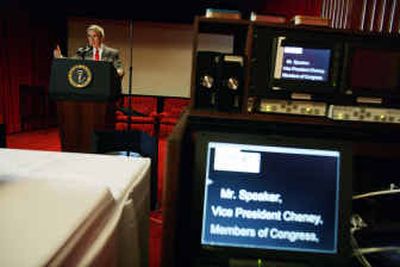Opposition hardens against Bush’s Social Security plans

WASHINGTON – As President Bush prepared to deliver a detailed sales pitch for Social Security restructuring in today’s State of the Union address, Senate Democrats suggested Tuesday that they had enough votes to block the kind of overhaul he was seeking.
White House officials said Bush’s comments on Social Security would be his most specific yet, and would receive equal billing with Iraq and other foreign policy concerns.
Even before the president could put the final touches on a speech that had gone through 17 drafts by Tuesday afternoon, the leader of Senate Democrats declared his colleagues “united” in opposing Bush’s proposal to let younger workers divert a portion of their payroll taxes into private investments accounts they would control.
“President Bush should forget about privatizing Social Security,” Senate Minority Leader Harry Reid, D-Nev., told reporters after a Democratic caucus meeting Tuesday morning. “It will not happen. The sooner he comes to that realization, the better off we are.”
Although one Senate Democrat said he had not yet made up his mind, Reid said he was confident none would back the president’s plan.
And that opposition alone would appear sufficient to doom Bush’s plan in the Senate. It takes 60 senators to break a filibuster and force a vote on a bill; Republicans number 55 in the chamber.
Even if the president ultimately managed to strike some kind of bargain on the structure of private accounts, Reid’s comments illustrated the difficulty Bush faced in winning support for his Social Security initiative.
The clash came as both sides stepped up the battle to rally public support to their sides over an issue with huge economic, ideological and political ramifications. Bush has put Social Security restructuring at the top of his second-term domestic agenda. Democrats have declared their determination to preserve the existing structure of the retirement program.
So far, the president has declined to endorse a specific plan, saying only that he wanted to address Social Security’s long-term financial shortfall without raising payroll taxes or changing benefits for existing retirees, and that personal accounts must be part of the package.
But in today’s speech, “he will offer details of how to move this debate forward,” said a senior administration official who declined to be identified on grounds that the White House wanted to keep the focus on Bush.
The official indicated that Bush would be more forthcoming about the need to reduce benefits for future retirees to bridge the gap between payroll tax collections and payouts promised under current law, as well as to offset the cost of private accounts.
The president “fully recognizes that to permanently fix Social Security is going to require action beyond just personal accounts,” the official said.
Bush plans to hold campaign-style events in five states that voted for him last year but have Democratic senators. By rallying public support in such states, he hopes to generate pressure on their Democratic lawmakers to back his plan.
Treasury Secretary John W. Snow met Tuesday with two such Democrats, Sens. Kent Conrad of North Dakota and Max Baucus of Montana. Bush plans to visit both states this week, and he has invited Conrad to fly with him.
Republicans cautioned that the battle for public opinion was just beginning.
White House officials said Bush would devote the first half of tonight’s address to domestic policy issues, with Social Security as the centerpiece. He will also discuss tax simplification, legal reform, judicial appointments, immigration law, education and job training, officials said.
The second half of Bush’s speech will be devoted to foreign policy, including the aftermath of Sunday’s election in Iraq and the prospects for advancing the Middle East peace process following last month’s Palestinian election.